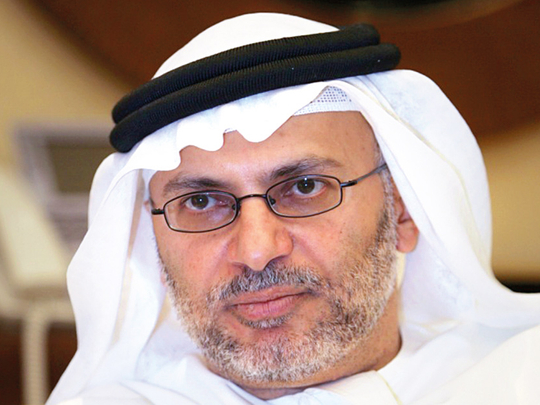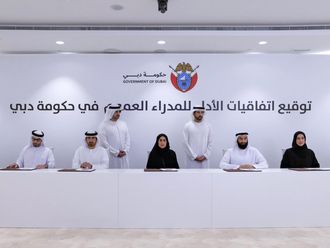
London: The United Arab Emirates has said a western monitoring mechanism will be needed to force Qatar to abide by any agreement to end its support for terrorism, in the first suggestion from any of the countries boycotting the tiny Gulf state that outside intervention may be needed to end the crisis.
Dr Anwar Mohammad Gargash, the UAE Minister of State for Foreign Affairs, said its allies in Saudi Arabia, Egypt and Bahrain did not trust Qatar as he spoke in London on a visit intended to rally diplomatic support for the embargo.
“This is about behavioural change,” Gargash said. “If we get clear strategic signals that Qatar is going to change and it will stop funding violent Islamist militants that is the basis for a discussion, but we would need a monitoring system. “We do not trust them. There is zero trust, but we need a monitoring system and we need our western friends to play a role in this.”
He said the monitoring would aim to ensure Qatar was no longer funding extremism, harbouring extremists in Doha, or providing support to the Muslim Brotherhood, Hamas and Al Qaida. Qatar denies supporting the groups. Various countries — including France, UK, Kuwait and Turkey — have been trying to act as mediators.
Gargash said “there are no specific asks right now”, adding he did not want to get into trading offers.
Gargash insisted “at higher levels in Washington there is a big understanding of what is going on”, saying Trump “had aired the views that are being articulated about Qatar behind closed doors”.
Gargash insisted “this very serious dispute is not about a personal family rift or vendetta between monarchies, or an attempt to curtail Qatar’s foreign policy. How far are we willing to take this — we are willing to take this to isolation in the Gulf Cooperation Council.
“In 2014 we tried to do things diplomatically and we failed. The emir of Qatar did not stick to his word so this time we are saying we will ostracise you. I’m worried less about escalation, and more about isolation of Qatar.
“We have tried the carrot with Qatar, and now we must try the stick. What we have learnt in the past few years is the grey area between extremism and terrorism has become more defined. The extremist narrative has to be countered to defeat terrorism.”
He identified 59 individuals walking free in Doha that had been identified as terrorists or financiers of terrorism, including 14 that are sanctioned by the US State Department and nine by the United Nations. Gargash said it was like entering a crime scene and finding Qatar’s fingerprints in every room.
Saudi Foreign Minister Adel Al Jubeir told a press conference: “We have a list of grievances we shall give to Qataris fairly soon. It is about having a zero-tolerance policy. You cannot expect to be partners in the fight against extremism and terrorism when you have terrorists and terrorist financiers freely roaming your country.”
Tensions within the Gulf have been deepened by reports in the Arab press suggesting that Qatar’s ruling family and the former Libyan leader Muammar Gaddafi had conspired in 2010 to assassinate King Abdullah Bin Abdul Aziz, the former king of Saudi Arabia. Al Jubeir said he backed the reports and that Saudi authorities would release further details. Gargash said the reports were “a huge, huge twist and deeply disturbing”.
Gargash denied that the true source of extremism in the Middle East was Saudi Arabia, saying the kingdom was dealing with “legacy issues” at the highest level and adding that it was for the Saudis to judge if they were dealing with these issue fast enough.
He said Qatar was backing Jabhat Fateh Al Sham, formerly called Al Nusra Front — the Al Qaida franchise in Syria and in Libya that backs Al Qaida groups including Libyan Fighting Group, the Derna Shura Council and the Benghazi Shura Council. He said: “It is like playing a football match when you discover one of your own team is trying to score an own goal in every match you play.”












